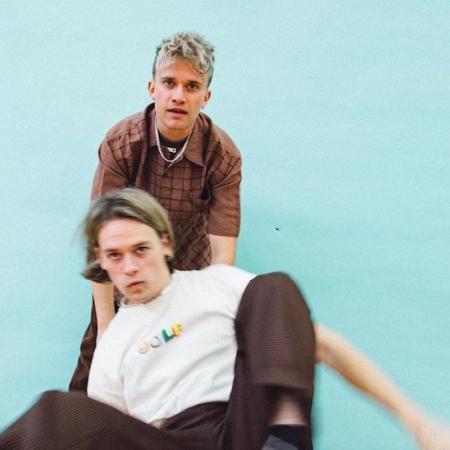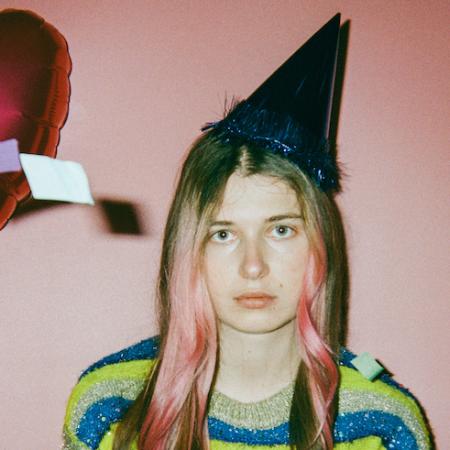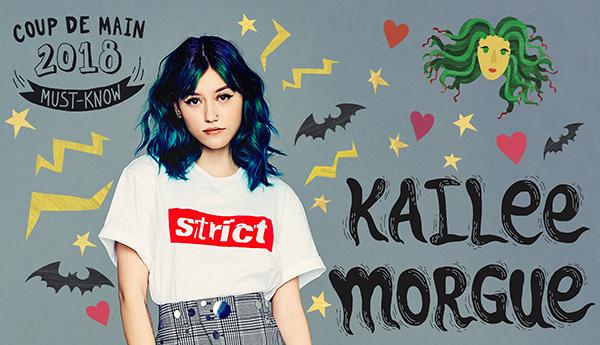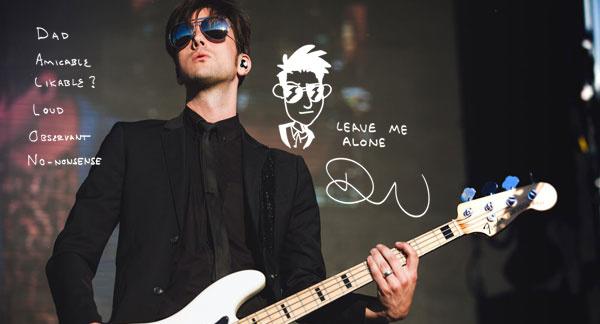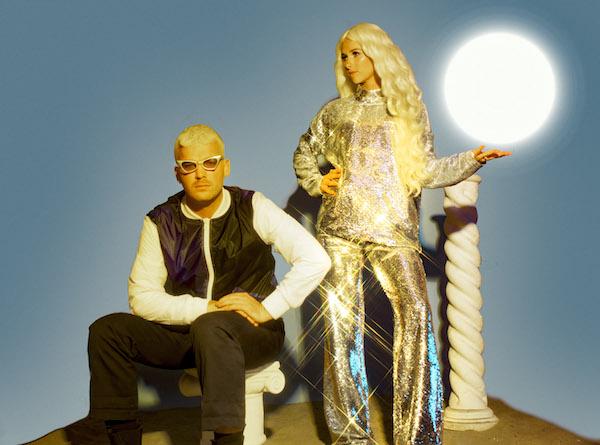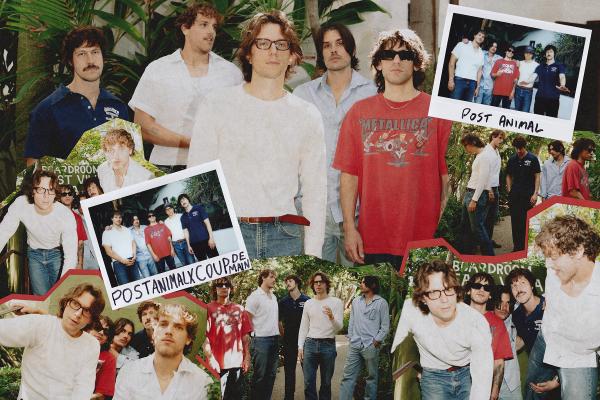On December 13th, 2010, an eleven-year-old Gracie Abrams wrote an entry to her diary as follows: "I've been composing my own songs on the piano and it's really a lot of fun! My 2nd one I'm currently working on is kinda strange. I really like it though." Nearly ten years later, and Abrams' debut 'Minor' EP is out in the world - seven songs which see her life experiences of growing up turned into relatable and thoughtful songs.
The EP's opening track 'Friend' sees her contemplate misunderstandings of emotions, singing, "I just can't believe you don't know what I'm feeling," and it's those sincere feelings which are explored further throughout the release. EP highlight 'tehe' sees Abrams ruminate on the failings of a past relationship ("Now I know it wasn't right"), before the closing track 'Minor' sees her declare, "I would drive all night to get to you."
We caught up with Gracie Abrams via Zoom ahead of the EP's release to discuss the creation of the 'Minor' EP, reliving past experiences, and more...
...with songwriting specifically and with this project, especially, more than anything else, I've been able to take responsibility for myself because I think it's easy for me as a writer to kind of centre what I view is the problem with somebody else rather than taking the time to deeply look in the mirror and kind of see where maybe I went wrong.
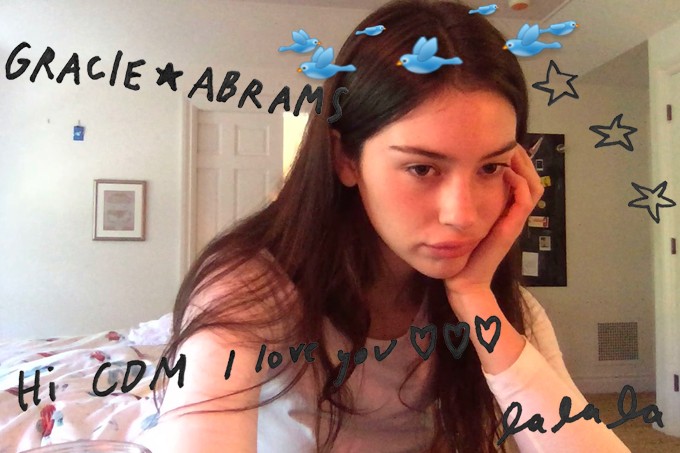
COUP DE MAIN: Firstly, 'tehe'! We need a moment of appreciation for it. Also, you teased the song’s existence in our first interview earlier this year.
GRACIE ABRAMS: I maybe overuse that phrase to the point where when we were actually titling the song, I was just like, "This feels like the obvious choice even though nowhere does that appear in the song." But it felt like the obvious choice.
CDM: You reflect on your optimism in 'tehe' when you sing, "Should’ve called it / But we never gave it up." Do you think that sometimes even when you know a situation or a relationship isn't going to work out, there's still a glimmer of hope? Why do you think that hope is something that we cling to so heavily?
GRACIE: For sure. I always feel like I'm more on the side of falling into the haze, in whatever situation I'm in. Maybe it's because I like to torture myself, but I think I tend to fall on the side of doing the imaginative thinking about a situation rather than looking at the cold hard facts.
CDM: One of the standout lyrics from the whole EP for me is when you sing, "Kept bending every rule 'til all of me was yours." I get shivers every time I hear it! Is that an important realisation to understand when you’re changing who you are for someone else and giving yourself up to them entirely?
GRACIE: Yeah, I think in my personal experience, I've had trouble recognising that until I'm out completely. And then it's a period that's just kind of self-deprecating in terms of realising how much was given up for another person. But with every experience I've had where I felt that way, you have kind of a higher level of awareness moving forward, so I never feel regret in that sense because I think it just informs future interactions with anyone.
CDM: The lyric you sing in 'Friend', "I just can't believe you don't know what I'm feeling," reminds me of "you don't know what I'm feeling" in 'Mean It'. Why is feeling misunderstood something that you're so drawn to in your songwriting and lyricism?
GRACIE: That specific phrasing, I didn't even really realise the parallels. I'm really fascinated by songwriting when you're getting the point across, but you're not even necessarily going in too deep. I'm such a detail-oriented person, but I guess with that particular phrasing, it's just a kind of disbelief when it can't be seen by someone else, but it's most intensely felt by you. It just washes over every single thought and every action. I guess in 'Mean It' and in 'Friend', it feels like very one-sided experiences. And that's when I like to write the most, when I feel most isolated.
CDM: "Just because you're hurting doesn't mean I'm not," you sing very relatably in '21' - I think it's so often a misconception where people don't comprehend other people feeling pain when it's something they might be feeling so strongly. Is it important for people to understand how pain and hurt is felt by the people around them?
GRACIE: Yeah, but I also don't think that there's been enough room for those kinds of conversations. Just culturally, I think we're only now kind of starting to catch up to how important it is to address mental health and to rely on people in your life and to reach out to resources that are available. I think that's why I started writing in the first place, I was feeling like I didn't have any other outlet, which was never true, but that's how it felt.
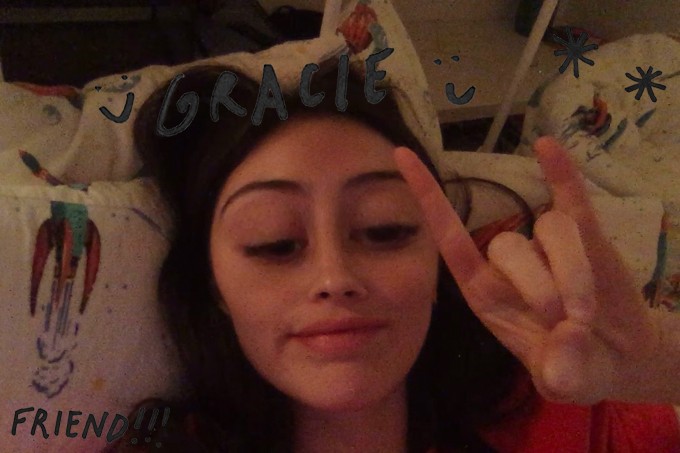
CDM: I love that easter eggs are something you always slip into your music and your videos - e.g. the 'Stay' box that you had in the 'Mean It' music video. Why is having your musical world so interconnected important to you?
GRACIE: Because it's funny to me. It's funny to be able to control little things that only you know for a certain amount of time. I think the way in which I feel like people know my music is so minimal that I don't feel like I'm being seen - whereas, I feel like there are so many artists that if they have an easter egg, people kind of know to be looking for them. For me right now, I'm having fun and it was honestly just learning how to be on the set of a music video, and someone was like, 'What if we did this?' And then I was like, "I want to always do that." So it's just kind of a fun bit of control. I love being in control because I'm crazy.
CDM: "I'll be the love of your life inside your head," you sing in '21'. Do you think that how people exist inside other people's heads can be dangerous, because in real life they can never be exactly how they are imagined?
GRACIE: Yes, period. 100%. I feel like again, kind of similar to the haze feeling where there's kind of an illusion about what is real, I feel like I spend so much of my time either romanticising or demonising people, which I'm trying actively - honestly, during quarantine - to retrain myself and just hold everything a little bit more lightly because everyone's just doing their best ultimately.
CDM: The water imagery throughout 'Under / Over' is quite powerful and it feels even more emotive with the production and ambience in that song, especially at the end. What memories do you have from the creation of that sound for the song?
GRACIE: A lot of it was because the people that I worked with on that song brought a cool energy that I wouldn't have necessarily been able to find on my own. These guys, Jack [Karaszewski] and Henry [Kwapis], and then Blake [Slatkin], they produced it. When Henry and Jack went in, they kind of started adding all these tiny weird little noises and just messing around. Every song that I've ever written has been on acoustic guitar or piano and then we build it up more, so it's sometimes hard for me to break out of that space. But making this project was a really unbelievable learning experience in terms of being able to see the big picture when I'm writing, to kind of just imagining what the possibilities could be. But Jack and Henry just did some crazy wizard shit at the end of that song and I loved it. To me, it feels like a tiny little ant parade, just trailing off. I loved it honestly, because it felt so visual.
CDM: You sing, "Swimming in the memories, I'm floating in the deep end." Can reliving memories in your head be both good and bad when looking back on past experiences?
GRACIE: When I think back on really memorable moments, I think it's interesting being able to identify, and maybe it's only because I'm just kind of growing up right now for the first time and in a real way, but I'm able to self-reflect and think about what I would have done differently or how I want to treat people moving forward. I think with songwriting specifically and with this project, especially, more than anything else, I've been able to take responsibility for myself because I think it's easy for me as a writer to kind of centre what I view is the problem with somebody else rather than taking the time to deeply look in the mirror and kind of see where maybe I went wrong. So I think it can be both for sure, but I'm trying to work on seeing the bird's-eye-view of a situation.
CDM: Do you feel like your songwriting has helped you to better understand your own feelings and experiences?
GRACIE: Yeah, because I don't think I'm as vulnerable anywhere else in my life - definitely not in a conversation. Definitely, not even across any other kinds of mediums of writing. I confront myself the most in my songwriting.
CDM: The outro of 'I miss you, I'm sorry' is so heartbreaking and haunting to listen to, with the repeated, "Everywhere I go leads me back to you.” Do you believe that in life, we are naturally drawn to certain people?
GRACIE: I think it can be both, but I was just talking about that with my best friend last night, just about having both been in college at the same time. You can meet a person that has had a completely different past than you and there's an undeniable connection in some capacity. The fact that that can happen alone made both of us go into this deep dark spiral about, like, who really are our people, and who in our lives is just kind of in our lives based on environment alone. So I am a firm believer of that undeniable connection or gravitational pull, but I think that's also because I am a romantic person.
CDM: You also contemplate the idea of 'forever' in that song, in the second verse singing that you "almost bought it." Is the concept of 'forever' an idealistic dream that we're all taught to hope for?
GRACIE: Yeah, and I think it sucks because I think it's really, deeply-- I think it's so unfair when you think about how early on we consume the notion of a soulmate, or what a happy ending looks like. I think it is so unfair to every other kind of relationship because there is the craziest spectrum... I mean, it's just like, in what world is that happening? Like, where? Where, once in real-life does that exist?
CDM: Just in romantic comedies.
GRACIE: Exactly. So yeah, I think it sucks. It's cruel.
CDM: You also sing in that song, "Nothing happened in the way I wanted." Do things in life ever turn out the way that we expect them to?
GRACIE: Sometimes, but I think in relationships, if you're in a healthy relationship, you can't ever be in control of the other person. I guess when I wrote that line I was thinking about just how two people in the relationship were independently changing in a really great way but you don't expect that to happen and you don't want that to happen. And so when it does, it kind of hits you like a bus.
CDM: You acknowledge in 'Long Sleeves' that you can't love someone because you've got a lot to work through. Do you think it's hard to commit to someone else and to love someone else when you're still dealing with your growth and understanding in life?
GRACIE: I mean, growing up, my mom always said the thing that I feel like so many moms do - the 'you can't love anyone until you love yourself' type of vibe. So I always carried that with me forever, and I think it's just hard because everyone is so constantly changing all the time. I think it's more about being patient with yourself than loving yourself in whatever way people expect you to when they hear that phrase. I feel like I am patient with myself, but I'm also riddled with insecurities. So on paper, I don't necessarily think it looks like I love myself all the time. But I am trying to create space to let myself get to that point a bit more.
CDM: It's so cool to hear 'Minor' in its completed form, after you shared the performance of it on your YouTube before your first single ever came out. You sing, "I'm all out of luck." How much of relationships do you think is hard work versus luck?
GRACIE: That's such a good question; that's so interesting. I mean, I think if you care about something you should work towards it - and then you work for it and it's all about adjustment, while also maintaining what's real for you. I feel like I've been really lucky for the most part in my relationships across the board with my friends, or significant others, or family, whatever it is. But as I've gotten older, but mostly just the past year - and especially since being in quarantine living with my family again - I've found you have to be willing to do the work. <laughs>
Gracie Abrams' 'minor' EP is out now - listen to it below:



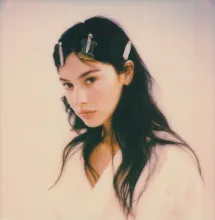 Gracie Abrams
Gracie Abrams